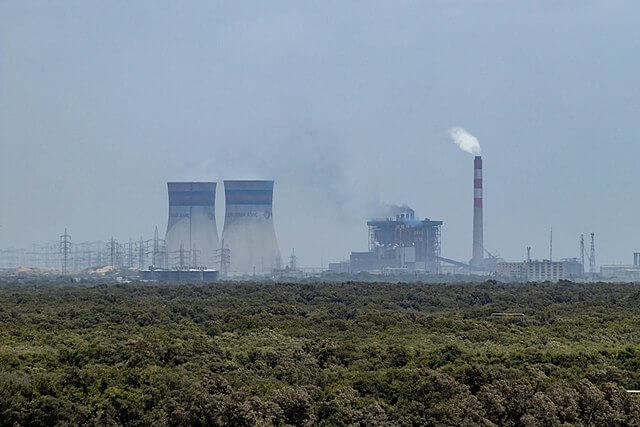
Scientists are issuing a dire warning as greenhouse gas emissions soar to unprecedented levels, posing a significant threat of global heating.
A study published in Earth System Science Data reveals that the world is rapidly depleting its carbon budget—the maximum amount of carbon dioxide that can be released into the atmosphere while keeping temperatures within 1.5 degrees Celsius above pre-industrial levels.
The remaining carbon budget is estimated to be around 250 billion tonnes, a significant decrease from the 500 billion tonnes reported just a few years ago. At the current rate of greenhouse gas emissions—approximately 54 billion tonnes per year—the budget will be exhausted before the end of this decade.
Prof Piers Forster, the director of the Priestley Centre for Climate Futures at the University of Leeds, and lead author of the paper, said: “This is the critical decade for climate change. Decisions made now will have an impact on how much temperatures will rise and the degree and severity of impacts we will see as a result.”
In response to this alarming situation, governments are convening in Bonn to prepare for Cop28, a crucial United Nations summit on climate change scheduled for November in the United Arab Emirates. Cop28 is widely regarded as one of the final opportunities to steer the world towards meeting the objectives outlined in the 2015 Paris climate agreement and maintaining the 1.5-degree threshold.
Sultan Al Jaber, the president-designate of Cop28, is under immense pressure to develop a comprehensive plan for the upcoming talks that will facilitate the much-needed course correction. Despite holding a dual role as the head of UAE’s national oil company, Adnoc, Al Jaber contends that his involvement in the private sector will benefit the negotiations by introducing a business mindset and engaging the private sector.
Prominent figures in the climate talks, such as John Kerry from the United States and Frans Timmermans from the European Union, have commended Al Jaber. However, concerns persist among campaigners who question the potential conflict of interest inherent in Al Jaber’s position.
During Cop28, participating nations will conduct a global stocktake—a comprehensive evaluation of their progress in meeting emissions reduction commitments since the signing of the Paris agreement. Regrettably, the stocktake is likely to reveal that the world has veered significantly off track. Greenhouse gas emissions have continued to rise, despite a temporary decline in 2020 due to COVID-19 lockdowns in various countries.
The Intergovernmental Panel on Climate Change’s 2018 assessment indicated that global emissions must be reduced by nearly 50% by 2030 compared to 2010 levels to remain within the 1.5-degree threshold and achieve net zero emissions by 2050. However, this calculation was based on the assumption of a 7% annual decline in emissions during the 2020s. Given the ongoing increase in emissions, the rate of decline must now be much more substantial to stay within the 1.5-degree limit.
Joeri Rogelj, co-author of the new paper and a professor of climate science at Imperial College London, told the Guardian: “The years of continued high emissions as the updates the remaining carbon budget mean that by now we should be doing more. That means either moving forward the global goal net zero date for CO2 from around 2050 to about 2035, or cutting much deeper by 2030.”
Earlier this year, the International Energy Agency observed a plateau in emissions from the energy sector, the largest source of greenhouse gas emissions. However, only 18 countries have consistently decreased their emissions. Majid Al Suwaidi, the director general of Cop28 and a key advisor to Al Jaber, assured that the UAE would not utilise the global stocktake to publicly shame nations for failing to meet their Paris agreement pledges or reducing emissions at a sufficient pace.
With the clock ticking, urgent action is necessary to address the escalating greenhouse gas emissions and prevent catastrophic global heating. Cop28 represents a critical juncture for international cooperation, where commitments must be strengthened, and concrete measures implemented to ensure a sustainable future.
The world’s leaders must rise to the occasion and take bold steps towards achieving the goals set forth in the Paris climate agreement. The window of opportunity is closing rapidly, and failure to act decisively now will have severe consequences for generations to come.
“Climate change is one of those things where we’re all interconnected,” he said. “We can’t solve the problem individually. We have to solve as a collective. That’s what makes it difficult. And so there’s no simple bad guy, good guy in this discussion. Everybody has their solutions. Everybody has their ideas. And if we can bring people together behind those sort of common solutions, and drive the agenda behind that, that becomes a real powerful moment. And that’s what we’re trying to achieve at Cop28.”
——————————————————————————
At Natural World Fund, we are passionate about stopping the decline in our wildlife.
The declines in our wildlife is shocking and frightening. Without much more support, many of the animals we know and love will continue in their declines towards extinction.
When you help to restore a patch of degraded land through rewilding to forests, meadows, or wetlands, you have a massive impact on the biodiversity at a local level. You give animals a home and food that they otherwise would not have had, and it has a positive snowball effect for the food chain.
We are convinced that this is much better for the UK than growing lots of fast-growing coniferous trees, solely to remove carbon, that don’t actually help our animals to thrive.
This is why we stand for restoring nature in the UK through responsible rewilding. For us, it is the right thing to do. Let’s do what’s right for nature!
Donate today at https://naturalworldfund.com/ and join in the solution!

